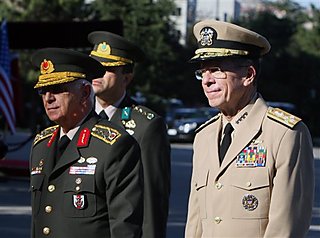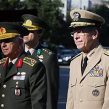
Admiral Mullen Discusses Critical Military Engagement in Turkey
Publication: Eurasia Daily Monitor Volume: 7 Issue: 160
By:

Admiral Mike Mullen, the Chairman of the US Joint Chiefs of Staff, visited Turkey last week. Although the official purpose of Mullen’s visit was to congratulate his Turkish counterpart General Isik Kosaner, recently appointed as the Chief of the General Staff, this introductory visit had no fixed agenda. Mullen had a chance to gauge Turkey’s position on many of US policies in the surrounding regions. In his meetings with Turkish military and civilian leaders, Mullen exchanged opinions on US withdrawal from Iraq, the Iranian nuclear issue and the international military presence in Afghanistan, as well as reiterating US support for Turkey on various issues such as its struggle against the Kurdistan Workers’ Party (PKK) and sales of military equipment for the Turkish armed forces (Hurriyet, Cumhuriyet, Radikal, September 5).
On the issue of Iran, Mullen downplayed recent disagreements, arguing that both Turkey and the US share the common objective of preventing Iran from acquiring a nuclear weapons capability. However, as Ankara’s earlier diplomacy on the Iranian nuclear standoff attested, such blanket mutual understanding was not enough to eliminate major differences of opinion over how best to deal with Iran (EDM, June 1). Ankara’s objections to a tougher US position and insistence on a diplomatic solution culminated in Turkey’s vote against a US-brokered UN Security Council resolution authorizing a new round of sanctions in June. Coupled with other crises, such as the problems encountered in Turkish-Israeli relations, this development further strained bilateral relations, prompting many US politicians and interest groups to question the strategic partnership with Turkey. In this tense environment, in August the Republicans blocked President Barack Obama’s nominee for the next Ambassador to Turkey, Frank Ricciardione. The vacant post highlighted how tenuous Obama’s Turkey policy remained, as well as the impact of Ankara’s recent policies on US domestic politics.
While for Washington a combination of diplomatic efforts and punitive sanctions is needed to deal with Iran, Ankara still believes that constructive diplomacy must be prioritized. Earlier in August, Mullen had raised tensions in the region, following his statement that military options against Iran remain on the table, which invited a harsh reaction from Iran, placing Turkey in a difficult diplomatic position (AFP, August 3).
In this context, Mullen adopted a rather balanced tone in Ankara and said that he had no plan to question Turkey over the Security Council vote and emphasized that he welcomed Turkish leaders’ statements that they would comply with UN sanctions against Iran. Nonetheless, this last point underscored continued differences over Iran. The Turkish government has reiterated on many occasions that it would implement only sanctions authorized by the UN, not the stricter set of measures being introduced by the US and the European countries.
Mullen also referred to ongoing discussions within NATO pertaining to the formation of a missile defense system against Iran, which will be part of the agenda of the upcoming NATO summit in November. Turkey is one of the possible locations for radars and interceptors. However, the Turkish position on this issue remains unclear, and it is unlikely to welcome such a proposal considering Ankara’s sensitivity to Tehran’s concerns.
Turkey’s contribution to the international military effort in Afghanistan was also discussed. Praising Turkey’s critical role in ensuring Afghanistan’s security through its provision of troops and training to Afghan security personnel, Mullen requested that Turkey maintains its military contribution after its command over international troops in Kabul and the surrounding area expires in October. Turkey has contributed to the NATO-led International Security Assistance Force (ISAF) since its inception immediately after the US invasion of the country in 2001, and has assumed the command of ISAF on many occasions. Although the US has pressured Turkey to increase its troop levels, Ankara has refused to do so, on the grounds that non-military means should be used to address the root causes of the conflict. Washington has come to acknowledge Ankara’s concerns on this issue, but wants to ensure that Turkey maintains at least its current level of commitment to ISAF.
An additional area discussed during the bilateral talks was Turkey’s specific role in US withdrawal plans from Iraq. Ever since the Obama administration announced its withdrawal plans, there has been speculation that Turkey would serve as one of the exit routes for US troops and military equipment (EDM, March 9, 2009). Denying such reports, Mullen stressed that he was not in Ankara to negotiate the terms of the US military exit from Iraq through Turkey. Since the transfer of military units will require authorization from the Turkish parliament, it is unlikely that Washington will seriously consider this option. Indeed, a recent statement from the Turkish foreign ministry also ruled out such an option, though welcoming the possibility of moving non-combat elements through the country. If an agreement is reached, Turkey would be ready to create a safe zone for the transfer of technical equipment (Sabah, September 3).
The visit by Mullen underscores the extent to which US-Turkish relations are characterized by military-strategic issues, and how the United States needs Turkey’s cooperation at best and at the very least its acquiescence for the successful execution of its military engagements in the regions surrounding Turkey. Therefore, Turkey is a key part of discussions on major US military campaigns, which serves as a constraint on Washington and prevents it from severing ties with this critical ally over its independent policies. Turkey, in contrast, relies on US assistance and the transfer of military technology, which curbs any tendency on its part to pursue unilateral policies. Aware of this mutual interdependence in military-security affairs, civilian and military bureaucrats from both sides have intensified their efforts to maintain the pace of cooperation. Recently, Turkish foreign ministry officials visited Washington to reiterate Ankara’s determination to maintain strategic ties with the US. This message will perhaps be repeated during the visit to the US later this month by Turkish President, Abdullah Gul, and Foreign Minister, Ahmet Davutoglu, as part of the UN General Assembly.




